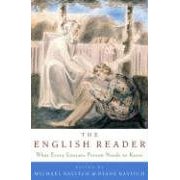OUP: The English Reader is a somewhat unconventional and eclectic mix of English prose and poetry. What was the thinking behind the selection process?
Michael and Diane Ravitch: One of the most exciting aspects of selecting the pieces for The English Reader was this unusual task of blending poetry and prose. We assigned ourselves a dual mission: to include the greatest and most influential passages of English literature, and to tell the reader a story about English intellectual history. Since our book is intended for the general reader, the selections are extremely diverse. For the poetry, we included most of the standard classic anthology pieces, but we also tried to put in a few surprises. We excerpted passages from great but less famous epic poems such as William Blake's “The Four Zoas” and Lord Byron's “Don Juan.” At the same time we included a few poems on the grounds of their popularity in their own day, such as Felicia Hemans' poem “Casabianca,” which generations of school-children once studied, and some later poets parodied.
The prose ranges even more widely. Certain pieces are intellectual and literary landmarks, such as the excerpts from Mary Wollstonecraft's “A Vindication of the Rights of Women” and from Edmund Burke's “Reflections on the Revolution in France.” For some of the other prose writers, the choice was not so simple. If we couldn't find a particularly famous essay or speech, we would choose instead a piece that both appealed to us greatly and that accurately represented the author's style and their point of view. As a consequence, alongside the more famous selections, we have some rarely anthologized pieces, such as “Man is a Toad-Eating Animal” by William Hazlitt. This essay not only displays his wonderful imaginative prose but it shows how radical British intellectuals and Romantic poets were fired up by the French Revolution. It is a good companion piece to the excerpt from Edmund Burke, who opposed the revolution.
We also included songs, political speeches and sermons, all of which are usually segregated into their own separate anthologies. By mixing them all up, fascinating connections become apparent. All these forms of expression are arguments, in their own way, different voices in a four hundred year dialogue about love and death, democracy and religion, individualism and patriotism.
Click on the title of this post to read the rest
Saturday, December 16, 2006
Subscribe to:
Post Comments (Atom)

No comments:
Post a Comment